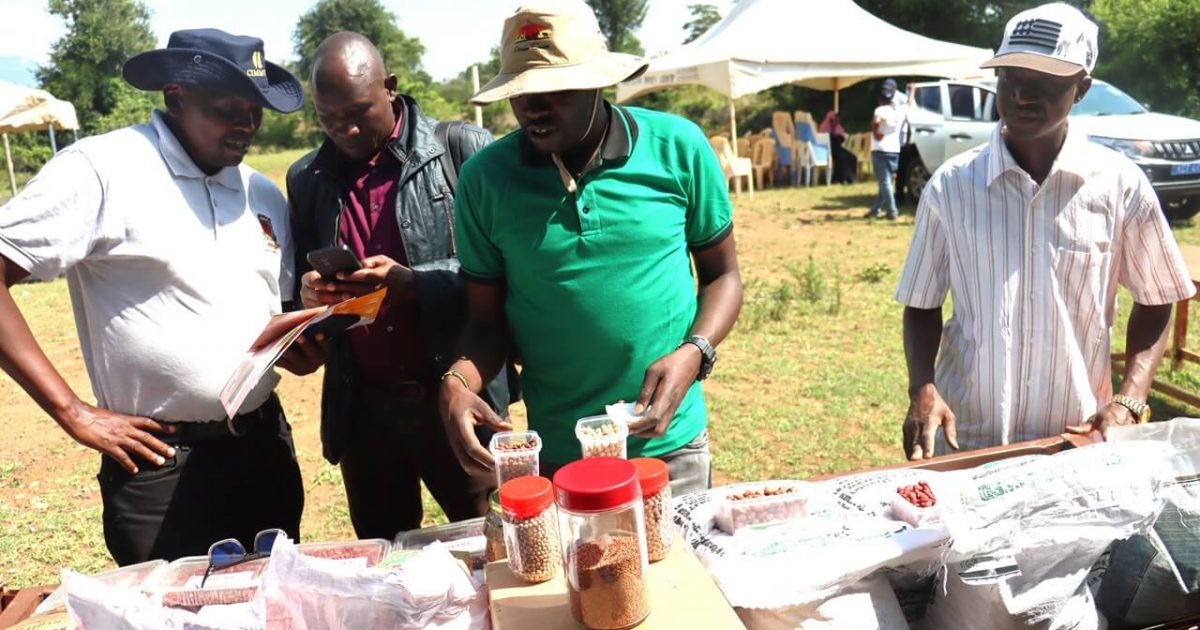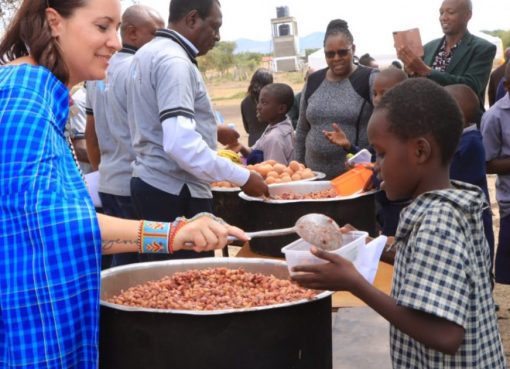Egerton University, with the support from United Nations, has unveiled new drought resistant, fast maturing, high-yielding and nutritious legume seed varieties and technologies aimed at addressing food insecurity in the region.
The University’s Agro-Science Park Seeds Unit unveiled the improved legume seed varieties, including those of groundnuts, beans, groundnuts, Pigeon peas, and Chickpeas.
Director of Agro-Science Park (GOK, Vision 2030 Flagship Project), Professor Paul Kimurto, said the varieties were developed in a four-year Food Safety for Africa (FS4Africa) project that was being supported by the European Union and was aimed at addressing food insecurity, especially in arid and semi-arid areas.
Prof. Kimurto said the FS4 Africa project, which kicked off in 2021 and is expected to wind up at the end of the year 2025, had made significant contributions to agricultural research and development needs of arid and semi-arid counties.
He said, with the unpredictable climate change realities, there was a need for investing in research that will yield seed varieties adaptable to nature’s vagaries.
He, however, assured that Egerton University’s Agro-Science Park Seeds Unit was dedicated to improving farming productivity, adding that a team from the unit was conducting field trials in Baringo County, testing new drought-tolerant seed varieties to support farmers in the dry region.
The Director indicated that the main objective of the seed development initiative was to contribute to poverty reduction in ASALs through increasing the income levels of farmers through the development and utilisation of appropriate agricultural technologies.
One feature of the initiative, the Director explained, was the participatory variety evaluation and selection process that, he said, was being led by Dr. Maurice Oyoo, a biotechnology specialist at Egerton University, adding that the hands-on approach entailed the involvement of farmers directly in selecting the seed varieties that work best for them.
Professor Kimurto said the method, also known as participatory plant breeding, ensured that farmers were active participants in the process, allowing them to choose high-yield, disease-resistant varieties that were well-suited to local growing conditions.
“This boosts crop productivity and ensures that the developed cultivars are practical and beneficial for the communities,” he said.
Professor Kimurto, who is also Head of Egerton University Seed Unit and Team Leader of the Seeds of Gold Communication Platform, explained that the new Ndovu groundnut variety was tipped to double farmers’ produce and incomes, as it could be used in the production of food, oils, biofuels and animal feeds and took only four to five months to mature.
Unlike the normal groundnuts, where farmers harvest on average 800 kg per acre, the Director explained that the Ndovu variety could yield 1.5 tonnes per acre, saying this increased farmers’ income.
The Director said the Ndovu variety was crossbred from the local groundnuts that are small in size to come up with a new larger and high-yielding variety that was best suited to hot and dry areas. Nyota and Mwangaza groundnut seeds were earlier released by the University to the market.
Saying that Egerton University had already contracted and was working with groundnut farmers in Baringo, Elgeyo Marakwet and Turkana counties, the Director said the farmers in the three counties have been trained on the best farming practices to reduce aflatoxins in groundnut harvests.
Aflatoxins, which are a growing concern in the region, are said to be toxic compounds produced by certain fungi that contaminate crops, posing serious health risks to consumers and reducing groundnut marketability.
“We have been empowering farmers to make informed decisions, such as embracing sustained innovation in drought-resistant seed varieties, environmentally friendly practices and better post-harvest management to reduce losses and planting at the right time,” Professor Kimurto said.
The groundnut varieties developed by the University, according to Professor Kimurto, were offering farmers up to 20 to 25 bags per acre of unshelled nuts if good husbandry was done and could also be grown in dry parts of Nyanza (south), western and eastern.
According to Professor Kimurto, Egerton Mbaazi M1, Mbaazi M2, Mbaazi M3 and Mbaazi M4 pigeon pea seeds and Tasha, Ciankui and Chelalang bean varieties that were all suitable for warm areas are among the high-yielding, disease- and drought-resistant varieties available at the Agro-Science Park Seeds Unit.
The Director explained that the university initially offered the drought-resistant Tasha, Ciankui and Chelalang beans to 100 farmers in Nyandarua, Uasin Gishu and Nakuru counties.
He said the beans were released after thorough research and in response to climate change that had made many places warmer.
He elaborated that the hybrid varieties produced 20 to 30 beans in each pod, unlike the other beans, which offer about half.
Under the just-ended Cassava Value Chain Upgrading (CVCU) project for secure food, nutrition, income and resilience of smallholder farmers in the arid and semi-arid lands of Nakuru County, the university incorporated 6,000 smallholder farmers in Njoro, Lower Subukia and Solai sub-counties.
Egerton University Deputy Vice Chancellor for Administration, Finance and Planning, Professor Richard Mulwa, said through the seed development initiative, 29 cassava varieties were developed, out of which 7 varieties matured within six months.
The University has also established nine cassava variety sites in the three sub-counties of Njoro, Lower Subukia and Solai.
According to Professor Mulwa, despite cassava’s capacity to withstand climate shocks, its production faced challenges, particularly from the destructive Cassava Brown Streak Disease (CBSD), with progress having been made in the fight against CBSD, including the identification of a Tanzanian variety of cassava which is resistant to the disease.
He revealed that five varieties have been identified to be the best suited for the regions in terms of yield, fast maturity and low cyanide levels.
“We are now in the process of transferring the resistance genes of the Tanzanian variety to the locally adapted breeds using molecular marker-assisted techniques. These new varieties will be a gem to farmers once certified for bulking and distribution,” he said.
He indicated that towards making the initiative a success story, the University was breeding varieties that are resistant to cassava mosaic disease and cassava brown streak disease that will be distributed to women and youth groups.
The don said the programme sought to increase average production for subsistence farmers from 2.5 metric tonnes per acre to 7 metric tonnes and for pre-commercial farmers from 5 metric tonnes to 10 metric tonnes per acre.
In researching and developing the climate-smart seeds, Egerton University has partnered with the International Crops Research Institute for the Semi-Arid Tropics (ICRISAT), the Kenya Plant Health Inspectorate Service (KEPHIS), the Community Action Research Project (CARP+), and the Kenya Agricultural Livestock Research Organisation (KALRO).
Other partners include the Centre of Excellence in Sustainable Agriculture and Agribusiness Management (CESAAM), East African Breweries Limited (EABL), Regional Universities Forum for Capacity Building in Agriculture (RUFORUM), the MasterCard Foundation and Alliance for a Green Revolution in Africa (Agra).
By Esther Mwangi and Nicole Nduuti



